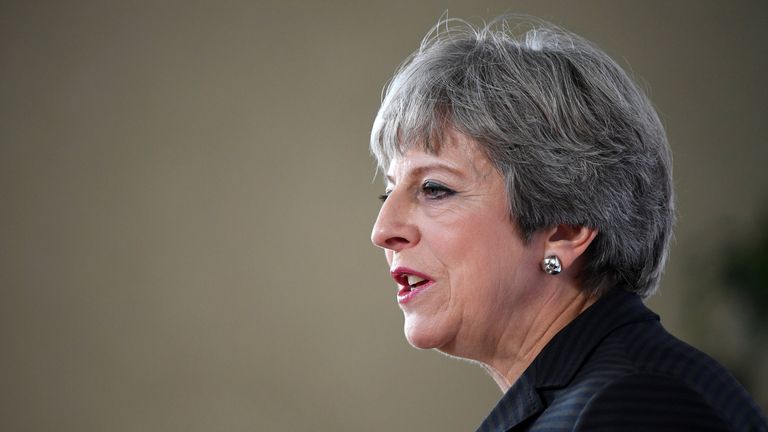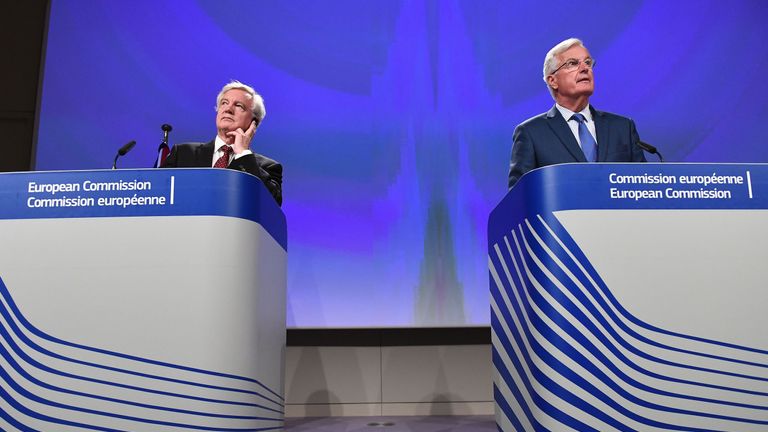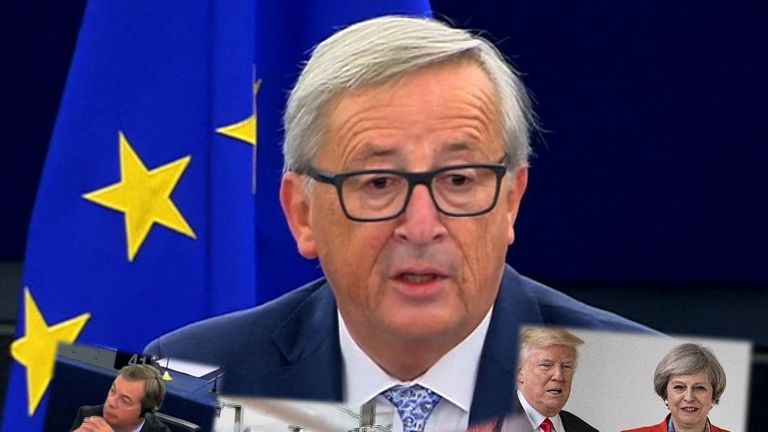Sticking points in negotiations dash hope of a Brexit breakthrough
The EU and Britain are struggling to reach consensus on big issues, eating into the time Britain needs to discuss other matters.聽
Thursday 28 September 2017 20:17, UK
"A constructive week", "progress", "a new dynamic".
That's some of the language we have been tantalised with at the conclusion of the fourth round of Brexit negotiations.
Some of those words came from the EU's top Brexit man himself, who has often been a depressing counter to our Brexit Secretary's optimistic spin after cross-table sessions in Brussels.
While Michel Barnier acknowledged the mood has improved and there has been significant movement on many matters, there is still some work to be done.
::
On the critical judgement of "substantive progress", it was a definite "non" from the Frenchman.
And no to progress means no moving on to trade talks and the future relationship - something Britain is desperate to do.
It is hard to see how a breakthrough can come any time soon (some might argue any time at all) because the sticking points are big ones.
Take the jurisdiction of the European Court of Justice (ECJ). The EU 27 say it should have ultimate authority over the rights of more than three million EU citizens in the UK after Brexit.
::
The UK continues to say no - insisting UK courts should rule on matters in the UK and those concerning any EU citizens there.
Neither side seems willing to budge. Mr Barnier has called it a red line, and after the latest talks said it was a stumbling block.
This is why his depressing warning that it could take months before the EU can even think about opening trade deals rings true.
There is no easy way around the issues for the UK. To accept the authority of ECJ after the UK exits the EU would be to diminish Theresa May's own authority in the eyes of many in her own party and many who backed Brexit in the referendum.
But will that cost be worth it to secure business? Or will the EU 27 eventually accept the idea being mooted of a new UK court to settle legal disputes after Brexit, running in parallel to the ECJ with both sides looking at the rulings of the other?
It would be a tough ask of the EU members who have been so firm on the issue - and for the UK it might smack of still being hooked to the ECJ in some fashion.
None of this bodies well for two imminent tests of how far things have come.
Next week, the European Parliament votes on whether its members think sufficient progress has been made. The resolution was put forward by the parliament's firebrand Brexit negotiator Guy Verhofstadt, who is certain himself to vote no. Given what Mr Barnier has had to say, it looks like the body of the parliament will follow.
That vote will be largely symbolic - but we need to remember the parliament will have to vote on and ratify any final Brexit deal, so it's important to see the how MEPs are feeling.
The second test will come at the end of next month, when it was hoped Mr Barnier would report to a European Council summit that the all-important sufficient progress HAS been made. That now seems highly unlikely given what he has just said after the latest round.
The need to continue thrashing out still-contested issues will eat into the time Britain wants and needs to move on to other matters.
There is a sense in many areas that things have progressed well - such as on the rights of EU citizens post-Brexit, and on the need to preserve the terms of the Good Friday Agreement when looking at Ireland and its border.
But there is still plenty to battle about, and as Mr Barnier is so fond of saying, the clock is ticking.







